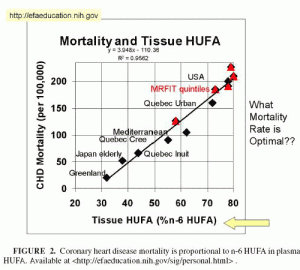Yesterday I recommended eating about a pound a week of salmon or sardines as part of the strategy for achieving an optimal omega-6 to omega-3 ratio.
Yet this is not the way many health-conscious people obtain omega-3 fatty acids. They buy fish oil capsules.
The trouble with this approach is that omega-3 fats are chemically fragile: their carbon double bonds are easily oxidized. EPA has 5 double bonds and DHA 6 double bonds, so they are the most vulnerable of all dietary fats. They easily become rancid.
Fish oil capsules often sit on a shelf for months before they are eaten. If someone offered you the opportunity to eat salmon that had been sitting on a shelf for six months, would you do it? No? Then why accept the same deal with salmon oil?
In fact, clinical trials have compared eating fish to eating fish oil capsules. Fish consumption has an excellent record in a number of clinical trials, but fish oil capsule supplements do not.
In the Diet and Angina Randomized Trial (DART-2), 3114 men with stable angina were followed for 3-9 years. There was a control group, a group advised to eat oily fish like salmon, and a group taking 3 fish oil capsules daily. There was a significant increase in sudden cardiac death among the subgroup taking fish oil capsules. [1]
So, give up the fish oil capsules: they’re all too likely to poison you. Instead, buy some fresh fish. Poached or baked salmon is an excellent summer dinner.
[1] Burr ML et al. Lack of benefit of dietary advice to men with angina: results of a controlled trial. Eur J Clin Nutr. 2003 Feb;57(2):193-200. http://pmid.us/12571649.












Recent Comments